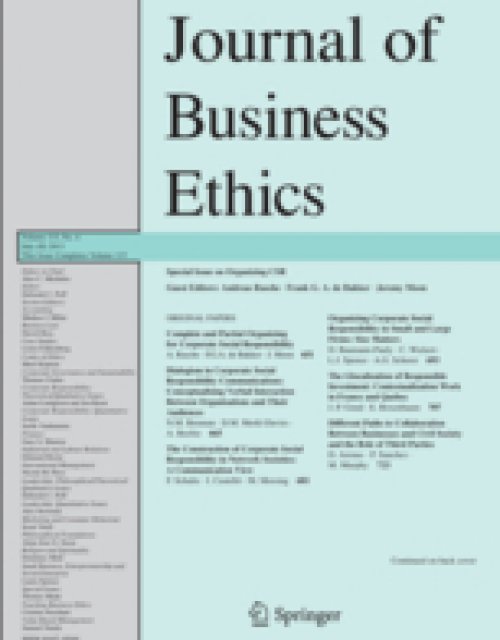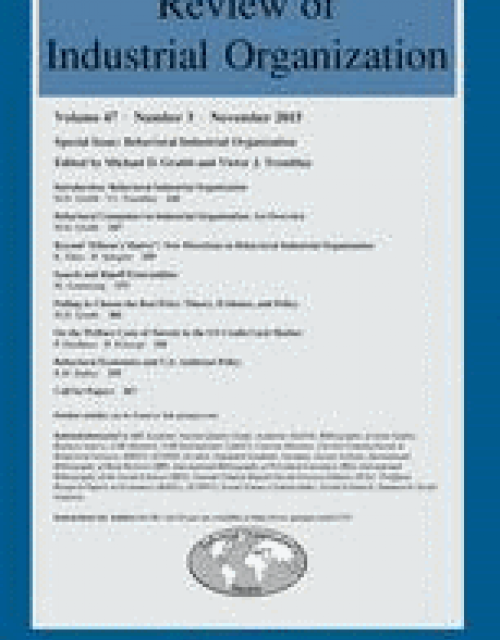Publication records
Subject(s)
Economics, politics and business environment; Ethics and social responsibility
Pages
79
Subject(s)
Human resources management/organizational behavior; Marketing
Keyword(s)
Corporate social responsibility, job product, employee job performance, cluster analysis, internal marketing, ideological job needs, developmental job needs, employee satisfaction, employee turnover intention
This paper examines how employees react to their organizations’ corporate social responsibility (CSR) initiatives. Drawing upon research in internal marketing and psychological contract theories, we argue that employees have multi-faceted job needs (i.e., economic, developmental, and ideological needs) and that CSR programs comprise an important means to fulfill developmental and ideological job needs. Based on cluster analysis, we identify three heterogeneous employee segments, Idealists, Enthusiasts, and Indifferents, who vary in their multi-faceted job needs and, consequently, their demand for organizational CSR. We further find that an organization’s CSR programs generate favorable employee-related outcomes, such as job satisfaction and reduction in turnover intention, by fulfilling employees’ ideological and developmental job needs. Finally, we find that CSR proximity strengthens the positive impact of CSR on employee-related outcomes. This research reveals significant employee heterogeneity in their demand for organizational CSR and sheds new light on the underlying mechanisms linking CSR to employee-related outcomes
© Springer Science+Business Media Dordrecht 2014. With permission of Springer
Volume
131
Journal Pages
319–335
Subject(s)
Economics, politics and business environment
Keyword(s)
Innovation, research, collaboration, performance, electricity, energy
Using a production function approach based on Cobb–Douglas, this analysis relates R&D efforts of 32 electric utilities on both sides of the Atlantic to their performance in terms of labour productivity. We find that higher R&D levels generally have a positive impact on revenues. However, only in the sub-sample of 16 electricity suppliers in Europe this effect is significant. Knowledge spill-over effects can be estimated for the US American sub-sample, since US utilities have bundled their R&D efforts in a centralized research institution and have to report that data. Our analysis reveals, though, that collaborative research efforts do not lead to positive spill-overs at the assumption of a time delay of one year.
Copyright © 2015 Elsevier Ltd. All rights reserved
Volume
86
Journal Pages
351–359
Subject(s)
Economics, politics and business environment
Keyword(s)
European competition policy, abuse of dominance, efficiency defense
JEL Code(s)
K21, L21, L40
Volume
11
Journal Pages
671–700
Subject(s)
Ethics and social responsibility
Keyword(s)
Business ethics, leadership, responsibilities of corporate leadership, social responsibility, organizational ethics, core purpose, change management, service management, privatization, corporate social responsibility, organizational purpose
Ulrich Homburg must have had an unpleasant déjà-vu on January 28, 2010, when hearing of headlines in Germany’s leading tabloid, Bild, about “Schaffnerin Herzlos,” the “heartless train conductor.” The board member of Germany’s national railway company, Deutsche Bahn AG (DB), and head of its passenger transportation division, was confronted with media reports about a minor who had been thrown off the train the night before by a DB train conductor. The incident happened on what turned out to be the coldest night of the winter, in one of the most deserted provincial train stations in the German state of Brandenburg. The girl was traveling without a valid train ticket. This incident was not the first of its kind. In the fall of 2008, Bahn employees had also forced several children and youths off of trains. The train company had subsequently given service personnel very clear instructions: Under no circumstances should minors be asked to leave the train. Now Homburg had to ask himself if further action was necessary.
We have successfully used this case with various different audiences ranging from MBA students to executive education. Given its rather untechnical and general perspective it can be used in a broad range of class contexts. However, the level of reflection and discussion will obviously vary according to the participant group and/or the position within a program. The case can be used to discuss topics such as: Responsible leadership and business ethics, corporate social responsibility, change management, and strategy and service management
| buy now | buy now | buy now |
Subject(s)
Finance, accounting and corporate governance
Subject(s)
Human resources management/organizational behavior
Keyword(s)
Motivation to lead, self-to-leader comparisons, self-efficacy perceptions, leader identity
Drawing on social comparison and identity literature, we suggest that individuals' comparisons of themselves to their own standards of leadership relate to their leadership motivation. We propose and test a model of motivation to lead (MTL) based on two types of self-to-leader comparisons: self-to-exemplar and self-to-prototype comparisons with respect to affiliation. In our main study, using data from a sample of 180 executives, we apply structural equation models to test our predictions. We find that self-comparisons with concrete, influential leaders of the past or present (self-to-exemplar comparisons) relate positively to MTL. We also find that self-comparisons with more general representations of leaders (self-to-prototype comparisons in affiliation) relate to MTL. Whereas the effect of self-to-exemplar comparisons is mediated through individuals' leadership self-efficacy perceptions, the effect of self-to-prototype comparisons is not. We replicate these findings in three follow-up studies using different research designs. We derive implications for theory and practice.
With permission of Elsevier
Volume
26
Journal Pages
802–820
Subject(s)
Economics, politics and business environment; Finance, accounting and corporate governance
Keyword(s)
Sophistication, naiveté, credit market, consumer exploitation
In the presence of naive consumers, a participation distortion arises in competitive markets because the additional profits from naive consumers lead competitive firms to lower transparent prices below cost. Using a simple calibration, we argue that the participation distortion in the US credit-card market may be large. Our results call for a redirection of some of the large amount of empirical research on the quantification of the welfare losses from market power, to the quantification of welfare losses that are due to the firms’ reactions to consumer misunderstandings.
© Springer Science+Business Media New York 2015. With permission of Springer
Volume
47
Journal Pages
341–354
Subject(s)
Economics, politics and business environment
Keyword(s)
Primary school enrollment, school lunches, natural experiment, ITT
At the end of 2001, the Indian Supreme Court issued a directive ordering states to institute school lunches – known locally as "midday meals" – in government primary schools. This paper provides a large-scale assessment of the enrollment effects of India's midday meal scheme, which offers warm lunches, free of cost, to 120 million primary school children across India and is the largest school feeding program in the world. To isolate the causal effect of the policy, we make use of staggered implementation across Indian states in government but not private schools. Using a panel data set of almost 500,000 schools observed annually from 2002 to 2004, we find that midday meals result in substantial increases in primary school enrollment, driven by early primary school responses to the program. Our results are robust to a wide range of specification tests.
© The editors of The Scandinavian Journal of Economics 2015
Volume
117
Journal Pages
1176–1203
ISSN (Online)
1467-9442
Subject(s)
Economics, politics and business environment
Keyword(s)
Competition, Germany
Secondary Title
The handbook of competition economics 2016
Pages
57–59

